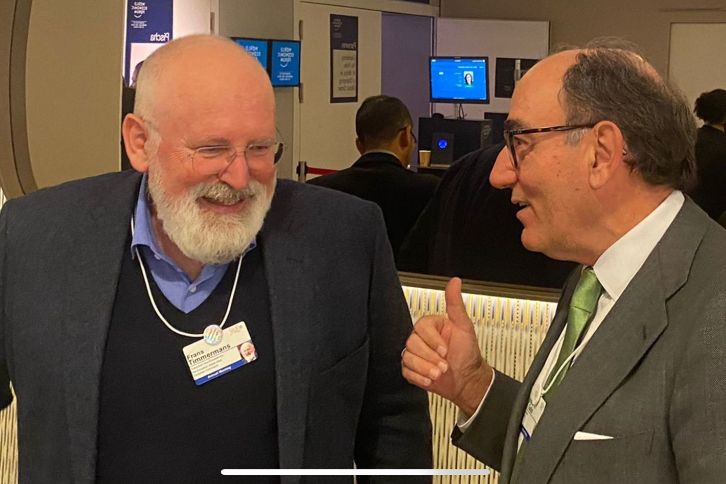News
-
31/05/2022Iberdrola and FCC launch EnergyLOOP to lead the way in wind turbine blade recycling Iberdrola, through its PERSEO programme , and FCC Ámbito, a subsidiary of FCC Servicios Medio Ambiente, have launched EnergyLOOP to lead the recycling of renewable installation components, one of the biggest medium- and long-term challenges in the sector. This initiative will also contribute to the energy transition and boost the circular economy in Spain. The initial objective will be the recovery of wind turbine blade components - mostly glass and carbon fibres and resins - and their reuse in sectors such as energy, aerospace, automotive, textiles, chemicals and construction. To this end, the new company plans to set up Spain's first blade recycling plant in Navarre. The facility will be located in the south of the region, a strategic location due to its proximity to some of the country's leading wind farms and with good connections to other regions with abundant wind farms. The project has the support of the Government of Navarre, as it is a strategic activity that positions the region at the forefront of the renewable energy sector by introducing technological innovation and circularity components and is aligned with regional smart specialisation. In its commitment to the promotion and competitiveness of renewable energies, the Government of Navarre has worked discreetly on the location of the first plant of this activity in the chartered community. The plant will be the first industrial-scale plant in Europe and will place Spain at the technological forefront of this industry. It will also contribute to the creation of an innovative and dynamic value chain. To this end, EnergyLOOP expects to create around 100 direct and indirect jobs over the decade and plans to invest around €10 million in the first facility. The Spanish wind industry - as a world leader with more than 28 GW of installed capacity - will face the need to recycle or reuse significant quantities of wind turbines before other countries. It is estimated that in Europe in 2030, around 5,700 wind turbines will be dismantled per year, coming from the repowering of wind farms or from facilities reaching the end of their useful life. In this context, EnergyLOOP will contribute to the transformation of the wind energy sector into a true circular economy by investing in integrated blade recycling solutions. This initiative will also improve its competitiveness and sustainability through the research and implementation of new recycling technologies, which will make it possible to absorb the increasing amounts of waste and adopt increasingly efficient solutions. The project will work on the different stages that enable the circularity of wind turbine blades, including on-site pre-treatment and conditioning, waste transport logistics, recycling technologies and the marketing of recycled products. Collaboration agreements with leading companies in their sectors The initiative undertaken by Iberdrola and FCC Ámbito has the support of Siemens Gamesa, which, as a global leader in the manufacture and maintenance of wind farms, will play a key role in this project, both because of its knowledge and experience in blade recycling and because of its penetration in Spain, with 53% of all the wind farms installed in the country. The birth of EnergyLOOP reinforces the circular economy strategies of FCC Ámbito and Iberdrola, which see this production and consumption model as a key lever for the energy transition. They will therefore seek to develop equally cutting-edge recycling solutions for other components of renewable facilities, such as solar photovoltaic panels or batteries, as the needs of these markets so require. With this approach, the new company will seek to establish the necessary alliances for the effective recovery of waste, extending the positive impact of the initiative to other actors along the entire value chain. It will also contribute to the research and development necessary for the effective circularity of these materials. Aligned with FCC Environment's Sustainability Strategy 2050 FCC Ámbito contributes its extensive experience in the recycling and marketing of secondary raw materials to the definition of the operational processes in the development of EnergyLOOP projects. The incorporation of new technologies in this type of project will allow FCC Ámbito to consolidate and position itself as a key player in the country's circular economy processes, a fundamental pillar of FCC Environment's 2050 Sustainability Strategy. This Sustainability Strategy consists of a 30-year business development roadmap that integrates very demanding objectives and commitments with high added value for the company and society as a whole, and which are grouped into four lines of action: environmental, social, excellence and good governance. The circular economy, at the core of the Iberdrola's business model The creation of EnergyLOOP, which responds to Iberdrola's commitment to a sustainable energy model, is part of its PERSEO Venture Builder programme to promote the development of innovative industrial companies working in new areas of electrification and in sectors that are difficult to decarbonise. Iberdrola defines its circular economy strategy as a process that affects its entire value chain, both its own production processes and those of its suppliers and customers. The group prioritises the contracting of companies with environmental management systems and, together with its suppliers, promotes eco-design, the analysis of the life cycle of products, and the use of materials with a low environmental impact. The company also promotes the circular economy by reducing the use of natural resources through its commitment to decarbonisation and electrification, and the more sustainable use of natural resources by promoting the use of more efficient and cleaner technologies and processes. It also encourages research to develop solutions for waste use and promotes responsible consumption through environmental awareness programmes. In 2017, Iberdrola joined the Pact for a Circular Economy: The commitment of economic and social agents 2018-2020, which the Spanish Government signed with the European Commission within the framework of the European Strategy for Growth 2020 and the so-called Roadmap to a resource-efficient Europe. The Pact, which was signed by public and private entities, seeks to involve the main economic and social agents in Spain in the transition towards a new economic model. FCC Ámbito, a leading company in circular economy services FCC Ámbito is the subsidiary of FCC Servicios Medio Ambiente specialising in the integrated management of industrial and commercial waste, recovery of by-products and soil decontamination. As a whole, it has a total of 39 treatment centres in Spain and Portugal, with more than 67 processing lines that guarantee the functionality of the facilities. FCC Servicios Medio Ambiente is the FCC Group company that has been providing municipal services and integrated waste management for 120 years, serving more than 60 million people in 5,200 municipalities around the world. In 2021, the company managed 24 million tonnes of waste and produced nearly four million tonnes of secondary raw materials and fuel derived from waste. The company has more than 770 operational waste management facilities, of which nearly 200 are environmental complexes dedicated to waste treatment and recycling, including 11 waste-to-energy projects with a capacity of 3.2 million tonnes per year and 360 MW of non-fossil electricity. PERSEO Iberdrola Ventures, 15 years innovating with startups Since its creation in 2008, PERSEO has invested €100 million in start-ups that develop innovative technologies and business models, focusing on those that improve the sustainability of the energy sector through further electrification and decarbonisation of the economy. The programme has focused its activities on analysing business opportunities and technological collaboration with start-ups and emerging companies around the world, analysing 300 companies each year and creating an ecosystem of almost 7,500 entrepreneurial companies. This investment instrument currently holds a portfolio of eight companies. Through PERSEO, Iberdrola carries out more than 25 real tests of technologies per year, which serve as a first step towards establishing a commercial relationship or partnership with entrepreneurs. In addition, in the last two years the group has launched a total of fourteen challenges in which 700 start-ups have participated. READ MORE
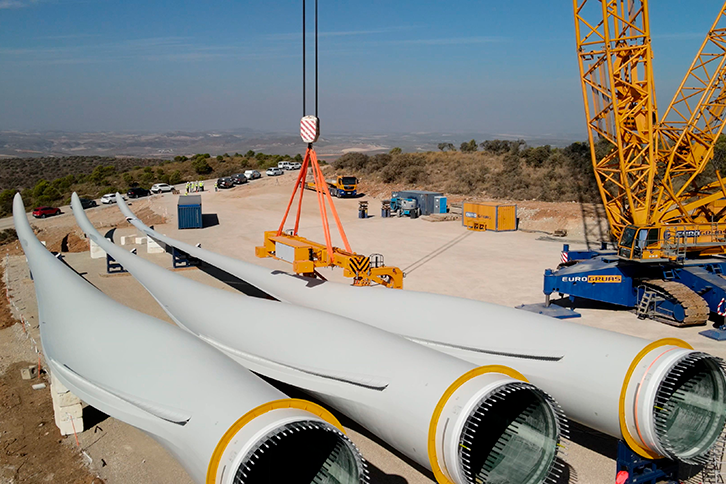
-
31/05/2022Galán calls on Brussels to accelerate investment in green hydrogen The Chairman of the Iberdrola Group, Ignacio Galán, together with the Commissioner for Energy, Kadri Simson, participated in the Green Hydrogen Summit held in Brussels to discuss the policies needed to accelerate the adoption of renewable hydrogen in Europe and enable the implementation of the European Commission's REPowerEU plan, with the aim of reducing dependence on fossil imports. The meeting, organised by the Renewable Hydrogen Coalition (RHC), brought together representatives from leading companies in the sector, EU decision-makers and hundreds of stakeholders to discuss the contribution of green hydrogen to decarbonisation and energy independence . The European Commission estimates that an acceleration of green hydrogen and its derivatives would reduce the EU's dependence on natural gas from Russia by approximately 27 bcm (27 billion cubic metres). The chairman of Iberdrola, Ignacio Galán, and chairman of the RHC since last September , congratulated the European Commission "for its strong leadership in REPowerEU", which should be accompanied by "stable and favourable policies that stimulate supply and demand and drive investment". Galán assured that "renewable hydrogen is a solution for today and for the future. It can significantly replace imported fossil fuels and the polluting hydrogen manufactured from them". In this sense, he stressed that "the members of the Renewable Hydrogen Coalition are helping to meet the EU's climate and energy ambition, making our continent cleaner and stronger thanks to home-grown hydrogen with European technologies". Energy Commissioner Kadri Simson stressed that "we need to diversify away from Russian fossil fuels. This means accelerating the ecological transition. Renewable hydrogen plays a crucial role in decarbonising industry and transport that is difficult to electrify. We need it for the planet, for our independence and for energy supply security. With RepowerEU, we plan to deploy this solution faster, taking our EU Green Deal ambitions to the next level and giving us the tools to make it happen." In this context, the RHC calls on policy-makers to take the following measures without delay * Adopt a definition of renewable hydrogen. The coalition welcomes the draft legislation proposed by the EC and recognises the important efforts made to better reflect the reality of projects: lengthy and complex authorisation procedures slow down the deployment of renewables that Europe needs to meet its energy climate targets. To meet REPowerEU's ambition, renewable hydrogen supply must be allowed to increase and its business cases must be secured. * Speed up permitting for renewables and also for renewable hydrogen installations, in the interest of the public and industry. Expedited permitting is crucial to build the additional capacity needed for renewable hydrogen production. * Adopt the most ambitious binding targets for boosting renewable hydrogen and fuel derivatives in hard-to-electrify industry and transport, as proposed by the European Commission. For RHC, binding targets are essential to send a strong signal to the market, unlock existing demand and drive major investments in the value chain. * Ensure fast and simplified access to support and financing instruments. Economic actors still face high costs for switching to clean technologies. According to the Renewable Hydrogen Coalition, carbon contracts for difference could have a major impact if properly designed and quickly accessible, accelerating uptake by industrial actors. The Renewable Hydrogen Coalition believes that the EU is at the right time to take decisive action to reach the European target of a 2,000-fold increase in current green hydrogen production capacity. "Increasing production capacities in line with REPowerEU's ambition will create a new European industrial champion: electrolysis. Building 120 GW of electrolysers in the EU in less than eight years requires an unprecedented effort from manufacturers and unconventional policy instruments. Industry and policy makers share the responsibility to drive the market with the necessary scale and speed. We cannot afford to make a mistake," said RHC Vice President Nils Aldag. Iberdrola, an example of commitment to green hydrogen In its commitment to leading the energy transition, Iberdrola is spearheading the development of green hydrogen with more than 60 projects in eight countries (including Spain, the United Kingdom, Brazil and the United States) to meet the electrification and decarbonisation needs of sectors such as industry and heavy transport. The group plans to invest 3,000 million euros in green hydrogen projects over the next few years, with the aim of developing 400,000 tonnes of green hydrogen per year. As it did with renewables 20 years ago, the company has once again pioneered the new technological challenge of producing and supplying green hydrogen. It has inaugurated the largest green hydrogen plant for industrial use in Europe , which will produce 3,000 tonnes of green hydrogen per year. READ MORE
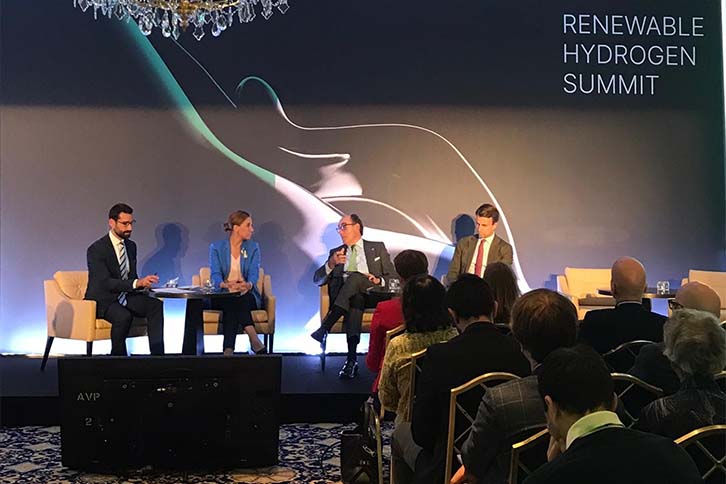
-
30/05/2022Iberdrola maintains its commitment to renewables with 500 new green MW under construction Iberdrola maintains its leadership in promoting the development of renewable energies in Spain, where it currently has 500 new MW of wind and solar power under construction. The company is developing ten new plants, with an investment of more than €350 million. Together, these facilities will have sufficient capacity to supply 257,000 homes with clean energy and will prevent the emission into the atmosphere of more than 117,000 tonnes of CO2 per year. Most of the new developments correspond to photovoltaic installations, in which the company will install around 720,000 panels. The Tagus I, II, III and IV plants in Extremadura, located in the town of Alcántara in Cáceres, stand out among them. With a capacity of 200 MW, these four facilities will have bifacial modules that allow for greater production as they have two light-sensitive surfaces. Thus, once they come into operation, they will together generate more than 313,650 MWh per year, which is equivalent to supplying more than 95,850 homes, avoiding the emission of 43,250 tonnes of CO2. Andalusia is another key region in Iberdrola's plans to develop solar energy. In this region, the company is promoting four new photovoltaic plants, declared to be of strategic interest by the Andalusian regional government. Three of them (Poleo, Cornicabra and Espliego) are part of the Guillena project, in the Seville municipality of Castilblanco de los Arroyos. These facilities, which have a total capacity of 144 MW, will supply energy to 72,000 homes and will prevent the emission of 32,000 tonnes of CO2 per year. Iberdrola is also building the Cespedera plant in Medina Sidonia (Cádiz), which with 27 MW will generate enough green energy to cover the consumption of 15,500 households and prevent the emission of 7,000 tonnes of CO2 per year into the atmosphere. These projects will generate up to 680 jobs during peak construction periods, thus contributing to the development of the Andalusian economy. In Castilla y León, Iberdrola is building the Villarino photovoltaic plant in Salamanca, which will install 50 MW of green energy. Once operational, this infrastructure will generate enough clean energy to supply a population of around 27,000 homes and will prevent the emission of 12,000 tonnes of CO2 into the atmosphere per year. In the same community, the company is building the 50 MW Valdemoro wind farm. This wind farm will have eleven wind turbines capable of supplying more than 48,000 homes and avoiding the emission of 23,000 tonnes of CO2 into the atmosphere. With these initiatives, the company will create up to 370 new jobs in the region, most of them local. The company is ready to start construction of another 245 MW of renewable energy. In addition, Iberdrola has already obtained the Environmental Impact Statements for the construction of the Alcarria photovoltaic projects (40 MW) in Castilla-La Mancha, Peñarrubia (50 MW) in Murcia and Virgen de Areños (50 MW) in Castilla y León. The El Escudo wind farm (105 MW) in Cantabria also has this authorisation. Construction will begin once the rest of the necessary permits have been obtained. Iberdrola has been leading the energy transition for more than two decades. The company has launched a historic investment plan of €150 billion over the next decade - €75 billion by 2025-, with which it expects to triple its renewable capacity worldwide and double its network assets. In Spain, the group leads the renewable sector with an installed capacity of more than 17,400 MW, which will reach 25,000 MW in the coming years thanks to its investment plan, which foresees allocating 14.3 billion by 2025 to the deployment of an ambitious renewables and smart grids plan. Iberdrola's share price is up more than 10% with dividends so far this year; its share price is at a 13-month high and is close to record highs. The energy company's capitalisation stands at around €73 billion, the highest on the Spanish stock market, and equals the combined value of Naturgy, Repsol and Endesa. The majority of investment banks recommend buying the company's shares, recognise its historical value creation and anticipate good expectations for the market in the medium and long term. READ MORE
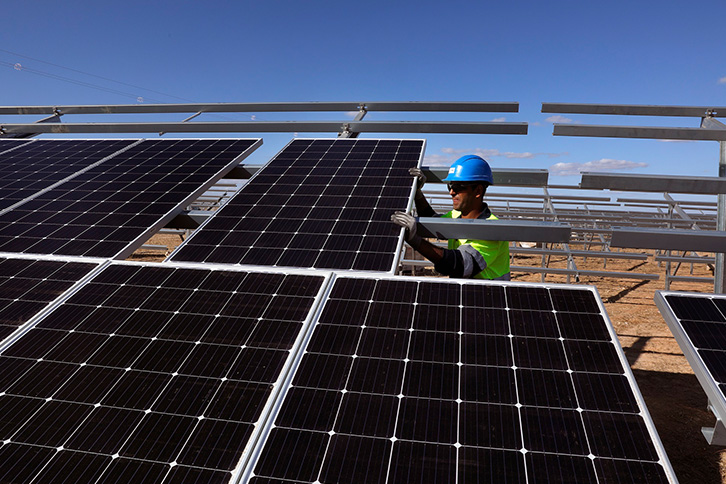
-
29/05/2022Iberdrola presents María León with the MVP award as the most outstanding player of the Iberdrola Queen's Cup final El presidente de Iberdrola Energía España, Aitor Moso, ha hecho entrega a María León, Mapi León, jugadora del FC Barcelona, de la distinción MVP ( Most Valuable Player), que reconoce a la jugadora más destacada de la final de la Copa de la Reina Iberdrola de Fútbol Femenino. El encuentro, disputado esta misma mañana en el Estadio Municipal de Santo Domingo en Alcorcón entre el FC Barcelona y el Sporting Club de Huelva, ha finalizado con la victoria del FC Barcelona por 6-1. De esta manera, el Fútbol Club Barcelona se hace con su novena Copa, siendo el equipo más laureado en esta competición. "Sentimos mucha alegría. Era una manera de acabar bien el año, consiguiendo tres títulos de cuatro posibles por lo que estamos muy contentas” ha explicado María León, MVP del partido, a pie de campo al finalizar el encuentro. Sobre la gran temporada del equipo blaugrana ha asegurado que “ha sido una temporada muy buena, lo único que se nos escapó fue la Champions pero somos conscientes de que es algo muy complicado. Hay que seguir trabajando porque está claro que vamos por buen camino”. Iberdrola sigue mostrando compromiso con el fútbol a través de su apoyo a todas las competiciones de este deporte. De esta forma, da nombre a la máxima competición nacional, la Primera Iberdrola, y a la segunda división, denominada Reto Iberdrola. Además, impulsa la Copa de la Reina y la Supercopa de España. Por segunda temporada consecutiva, la compañía ha respaldado también al colectivo de las árbitras de Primera Iberdrola. Aitor Moso, presidente de Iberdrola Energía España, ha destacado “el firme compromiso en continuar apoyando competiciones tan importantes como la Copa de la Reina Iberdrola para seguir dándole visibilidad al fútbol femenino. El nivel de las competiciones nacionales y su seguimiento es cada vez más elevado, lo que está ayudando a la consolidación de referentes para las nuevas generaciones”. Iberdrola, pionera en el impulso del deporte practicado por mujeres El impulso al deporte practicado por mujeres se ha convertido en una palanca clave para Iberdrola y para el fomento de la igualdad real entre hombres y mujeres, uno de sus valores esenciales. Iberdrola se convirtió en 2016 en la primera empresa en realizar una apuesta firme y global por la igualdad y el empoderamiento de la mujer a través del deporte. En la actualidad, la compañía respalda a 32 federaciones: gimnasia, triatlón, rugby, piragüismo, bádminton, fútbol, balonmano, voleibol, hockey, tenis de mesa, atletismo, karate, boxeo, surf, deportes de hielo, esgrima, actividades subacuáticas, bolos, deportes de invierno, halterofilia, judo, luchas olímpicas, montaña y escalada, natación, patinaje, pelota, remo, squash, taekwondo, tenis, tiro con arco y vela. Asimismo, da nombre a 32 ligas, todas ellas de máxima categoría, y a otras 100 competiciones con naming right. Reducir la brecha de género en el deporte es una apuesta por la igualdad de la mujer a través de la excelencia y se traduce en un importante referente para las niñas, desde su práctica de la actividad física y deportiva en todos los niveles del sistema educativo, para señalarles que el camino hasta el deporte federado y el de alto rendimiento es posible también para ellas. READ MORE

-
27/05/2022Iberdrola USA (Avangrid) accompanies His Majesty the King on his visit to New York The Spain-U.S. Chamber of Commerce in New York, which promotes economic relations between the two countries and has become one of the most important transatlantic business organisations, received His Majesty King Felipe VI yesterday. In the evening, Don Felipe received the Foreign Policy Association Medal, which was presented during the Association's annual dinner. At the latter meeting, His Majesty the King was received by the Permanent Representative Ambassador of Spain to the United Nations, Agustín Santos Maraver; the Consul General of Spain in New York, Caridad Batalla; the President of the Foreign Policy Association, Noel V. Lateef; and the Vice-President of the Foreign Policy Association, Sana H. Sabbagh, among other authorities. Both events were attended by Pedro Azagra, CEO of Avangrid, Iberdrola's subsidiary in the United States. The Chamber, founded in New York in 1959, is a private, non-profit American institution that promotes bilateral trade and investment. It represents the interests of companies that have established or are interested in establishing trade and business relations between Spain and the United States and promotes and strengthens relations between companies, from entrepreneurs and SMEs to large companies. Iberdrola's history in the United States is a story of growth. In less than two decades, the company chaired by Ignacio Sánchez Galán has become, through its subsidiary, one of the largest groups in the North American electricity sector, listed on the New York Stock Exchange since 2015. Avangrid has contributed to Iberdrola becoming the most valuable company on the Spanish stock exchange with a market capitalisation of around 73 billion euros and the leading European energy company. The firm is present in 25 states and manages more than 9,200 megawatts (MW) of generation capacity, of which more than 8,300 MW of renewables (mainly wind and solar PV), and more than 170,000 kilometres of power lines through eight distributors in New York, Connecticut, Maine and Massachusetts. In addition, the Spanish company has a portfolio of high-quality renewable projects in the United States of more than 22,000 MW, which represent a stable platform for continued growth over the next few years as the country meets its decarbonisation targets. Iberdrola plans to invest more than $30 billion between 2020 and 2025 in electricity grids and renewables, with the aim of doubling its clean energy capacity by 2025. Iberdrola has also been a pioneer in offshore wind in the United States, where it manages and develops a portfolio of more than 5,000 MW. It has the support of the Biden Administration, which is accelerating the implementation of this technology after committing to reaching 30 GW by 2030. In December 2021, the Spanish company began construction of the first large offshore wind farm in the United States (Vineyard Wind 1 ), which will be operational in 2023/24. The 800-megawatt (MW) project, located about 24 km south of the coast of Martha's Vineyard, will generate enough wind power to meet the demand of more than 400,000 homes. Its commissioning will also prevent the emission of more than 1.6 million tonnes of carbon dioxide per year, the equivalent of removing 325,000 vehicles from the road. It also owns the Kitty Hawk development area (2,500 MW) in North Carolina and has initiated the BOEM permitting process for the Kitty Hawk North project (800 MW), the first project to be developed in this area, and manages other farms at an earlier stage of development. In January 2022, it also closed the takeover of the offshore wind portfolio it shared with CIP (Copenhagen Infrastructure Partners) in the United States, with more than 2,000 megawatts (MW) of capacity, making it one of the largest developers of this technology worldwide. This portfolio includes Commonwealth Wind , a project selected late last year to supply power to utilities in Massachusetts. At 1,232 megawatts (MW), it is the largest offshore wind facility on the east coast of the country, will create 11,000 full-time equivalent jobs over its lifetime and will generate enough energy to power 750,000 homes a year. The Spanish company also obtained exclusive ownership of Park City Wind , an offshore project with a secured PPA and permits from the Bureau of Ocean Energy Management (BOEM) in the pipeline that, with its 804 MW, will cover 14% of the electricity demand of the state of Connecticut and prevent the emission of more than 25 million tonnes of CO2. Through the partner agreement, Iberdrola retains 50% of the Vineyard Wind 1 wind farm and the right to take control of it during the operation phase. In total, Iberdrola's investment in its US offshore portfolio could exceed $15 billion in the coming years. In addition, the Iberdrola group operates eight utilities in New York, Connecticut, Maine and Massachusetts, serving a population of seven million people, with 3.3 million direct customers. READ MORE
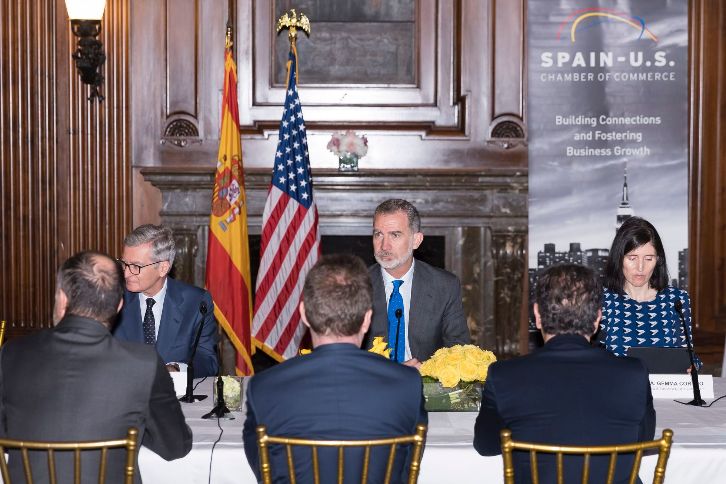
-
26/05/2022Iberdrola seeks start-ups to get the most out of data centre energy Iberdrola aims to squeeze the most out of energy efficiency in data centres. Through its PERSEO start-up programme and in collaboration with Schneider Electric and Microsoft, Iberdrola has launched a challenge that will reward companies that propose innovative solutions to make data centres more energy efficient. Data centres are key to the digitalisation and automation of smart grids - they host servers to provide cloud services to run algorithms and process large amounts of data - and consume an increasing amount of energy, some of which can be reusable. Data centre energy consumption has recently soared to 200 terawatt hours (TWh) per year. The aim of this challenge is to devise ways to recover some of this energy. The key to more efficient use of data centres is their cooling. Currently, a significant part of the energy used by these facilities is dissipated to the atmosphere in the form of heat. This energy in the form of heat could be reused, but this poses two technological challenges: the low temperature of the waste heat and the difficulty and cost of transporting it to the end user to, for example, provide district heating. Iberdrola, in collaboration with Schneider Electric and Microsoft, proposes several different formulas to get the most out of data centres in terms of energy: recovering heat for residential, commercial or industrial purposes, cooperating between different energy consuming systems (e.g., thermal and electrical) and with demand response capabilities, and even to offer flexibility and balancing services to grid operators. The prize will consist of signing a collaboration and testing agreement with PERSEO, which will assume the costs of these activities and provide the winner with the necessary technical support, as well as a real environment and data to test the solution, giving access to equipment, teams, infrastructures, high-tech sites and co-working areas. In addition, Iberdrola could offer the participant the opportunity to scale up the solution, adopting it through commercial agreements or even investing in the participating company. The registration period for the challenge began on 9 May and will end on 1 June, and the winner will be announced during this last month. 15 years innovating with start-ups Since its creation in 2008, PERSEO has invested more than €100 million in start-ups that develop innovative technologies and business models, focusing on those that improve the sustainability of the energy sector through further electrification and decarbonisation of the economy. The programme has focused its activities on analysing business opportunities and technological collaboration with start-ups and emerging companies around the world, analysing 300 companies each year and creating an ecosystem of almost 7,000 entrepreneurial companies. This investment instrument currently holds a portfolio of eight companies. Through PERSEO, Iberdrola carries out more than 25 real tests of technologies per year, which serve as a first step towards establishing a commercial relationship or partnership with start-ups. In addition, in the last two years the group has launched a total of fourteen challenges in which 700 start-ups have participated. Beyond the financial contribution, PERSEO's support to these companies has been key in defining their product and business, offering them its knowledge and access to Iberdrola's market. On the other hand, the work carried out with the start-ups has served our company as a technological antenna to find out where our sector is heading. READ MORE
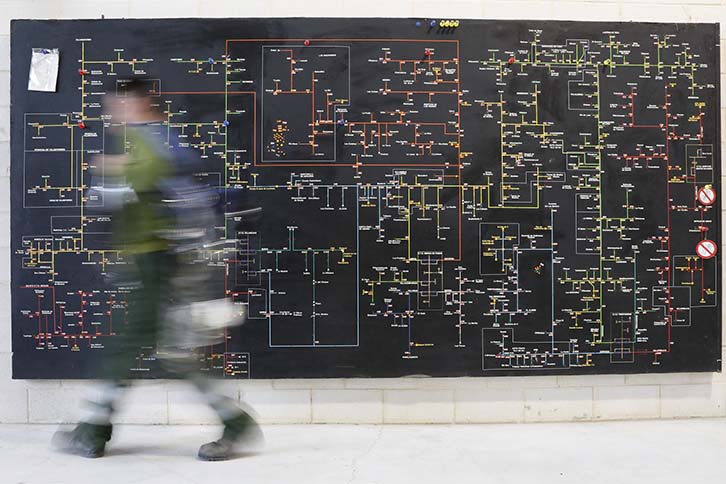
-
26/05/2022"Capping energy prices is the wrong way to deal with this crisis" Ignacio Galán, Chairman of Iberdrola, was interviewed by the economic television channel CNBC during the Davos Forum 2022 , which the CEO attended as a representative of the electricity company. During the conversation, which began with the gas price cap for Spain and Portugal, Galán highlighted the following ideas: * "When markets are intervened, the consequences are unpredictable. Theresa May's price cap in the UK a few years ago is a good example of the harsh economic consequences that manifest themselves 3, 4 or 5 years down the line". * "He is in favour of subsidies for certain periods of time in order to favour less mature technologies. For example, green hydrogen, which requires some initial support until it reaches a critical mass that makes it competitive, but does not agree with a generalised subsidy system". * "Europe has done many things right, such as the decision to try to decarbonise the European economy while creating quality jobs. However, if we had been quicker to build renewables, to build interconnections, to strengthen our grids and to make green hydrogen, we would have much less of a problem of supply shortages right now". * "Gas is a transitional technology and will be around for a while. The key is that renewables are cheaper than gas and provide self-sufficiency. Technologies such as solar or wind are already more competitive than gas, under normal conditions, and can be offered to citizens at lower prices". * "Accelerate the installation of more renewables, more grids and more storage. If we are able to combine this equation, we will have a different solution to the next economic crisis, which will come at some point". READ MORE
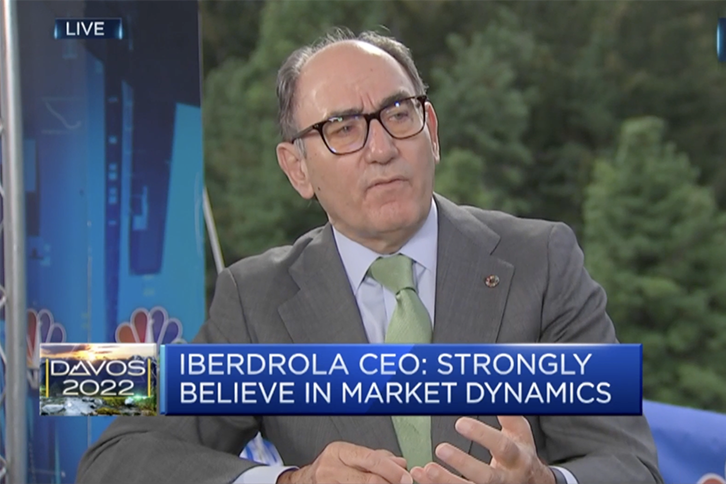
-
25/05/2022Galán announces Iberdrola to invest €3 billion in green hydrogen to accelerate the European Green Deal Ignacio Galán, Chairman of Iberdrola, announced at the World Economic Forum in Davos that the company will invest €3 billion in green hydrogen to accelerate the 'European Green Deal'. Galán pointed out that green hydrogen is now a major European challenge, an opportunity and that a stable European framework must be designed to boost investment in this technology. The Chairman of the Spanish utility highlighted that green hydrogen is set to bring enormous industrial opportunities to energy uses that are difficult to electrify. We cannot miss this train – he added – and, similarly to the rest of green technologies, a stable regulatory framework is required in order to attract investment. He also emphasised that a coordinated EU action is essential to achieve the ambitious targets, which include multiplying green hydrogen production capacity by 2,000 times. Iberdrola has been a pioneer in this technology, after the inauguration on May 13 of the largest green hydrogen plant for industrial use in Europe . The plant will produce 3,000 tons of green hydrogen per year and the company has a project pipeline which will require €9,000 investments in total. These investments have been agreed in the framework of the Manifesto on Implementing the European Green Deal in the New Global Context. Members of the CEO Action Group for the European Green Deal are ready to work together with policy makers to transform Europe into a greener continent, turning severe energy needs and global food security risks into economic opportunities. Action Group members have reinforced their commitment to accelerate Europe's green transition and stand ready to support European governments in developing policies that are "fit for purpose." The European Green Deal, supported by Iberdrola and agreed in 2020, plans to achieve a 55% emission reduction by 2030 and net zero by 2050. Iberdrola, an example of value generation Galán believes that Iberdrola's track record over the past 20 years showcases that a company’s commitment to the fight against climate change not only benefits the environment, but also its shareholders and society in general. Over the past 20 years, Iberdrola has grown sixfold in size, becoming the leading company on the Spanish stock exchange, with a capitalization of close to €70 billion, the largest electricity company in Europe and one of the world’s four largest. As a result of this growth, Iberdrola maintains 400,000 supplier jobs worldwide, has 40,000 employees and contributes more than €30 billion to the GDP of the countries where it operates. READ MORE
